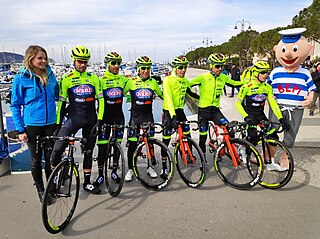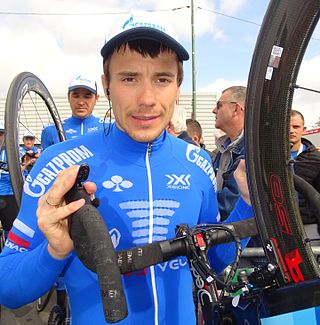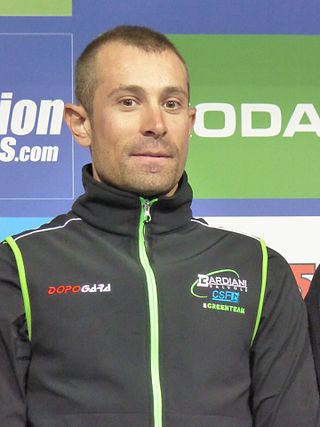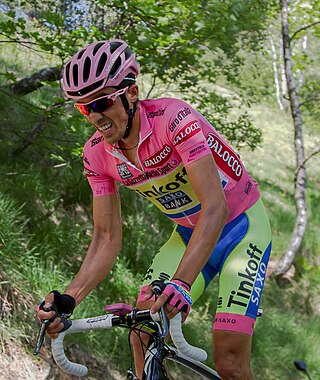
Vini Zabù was an Italian UCI ProTeam that existed from 2009 until 2021.

Stefano Pirazzi is an Italian professional road bicycle racer, who currently rides for UCI Continental team Amore & Vita.

Alexey Vladimirovich Tsatevich was a Russian professional road bicycle racer, who last rode for UCI Professional Continental team Gazprom–RusVelo.

The 2013 Milan–San Remo was the 104th running of the Milan–San Remo single-day cycling race. It was held on 17 March over a shortened distance of 246 kilometres, and was the fourth race of the 2013 UCI World Tour season. For the first time in 31 years, Milan–San Remo was held on a Sunday, after race organisers requested to change and move into line with several of the other Classic races.

Davide Formolo is an Italian professional road racing cyclist, who currently rides for UCI WorldTeam Movistar Team. Formolo turned professional in 2014.

Nicola Ruffoni is an Italian racing cyclist.

Manuel Senni is an Italian former cyclist, who competed as a professional from 2015 to 2021. He competed in four editions of the Giro d'Italia, having entered the race each year between 2016 and 2019.

The 2015 Giro d'Italia was a three-week Grand Tour cycling stage race that took place in May 2015. It was the 98th running of the Giro d'Italia and took place principally in Italy, although some stages visited France and Switzerland. The 3,481.8-kilometre (2,163.5 mi) race included 21 stages, beginning in San Lorenzo al Mare on 9 May and concluding in Milan on 31 May. It was the fifteenth race of the 2015 UCI World Tour. The Giro was won by Alberto Contador (Tinkoff–Saxo), with Fabio Aru (Astana) second and Aru's teammate Mikel Landa third.

Ilia Evgenievich Koshevoy is a Belarusian former professional cyclist, who rode professionally between 2015 and 2018 for the Lampre–Merida and Wilier Triestina–Selle Italia teams.

The 2015 Il Lombardia was a one-day cycling classic that took place around Lake Como in Lombardy in northern Italy on 4 October 2015. It was the 109th edition of the Il Lombardia one-day cycling race and was the final cycling monument of the 2015 season, as well as being the final race of the 2015 UCI World Tour. The race was organised by RCS Sport, who also organise the Giro d'Italia.

The 2016 Giro d'Italia was the 99th edition of the Giro d'Italia, one of cycling's Grand Tour races. The Giro started in Apeldoorn on 6 May with a 9.8 km (6 mi) individual time trial, followed by two other stages in the Netherlands, both between Nijmegen and Arnhem. After a rest day, there were 18 further stages to reach the finish on 29 May. These stages were principally in Italy, although two stages partly took place in France.

The 2017 Giro d'Italia was the 100th edition of the Giro d'Italia, one of cycling's Grand Tour races. The race started on 5 May in Alghero on the island of Sardinia, and ended on 28 May in Milan. The race was won by Tom Dumoulin, who became the first Dutch male winner of the Giro.

The 2018 Giro d'Italia was the 101st edition of the Giro d'Italia, one of cycling's Grand Tour races. The race started in Jerusalem on 4 May, with a 9.7 km (6 mi) individual time trial followed by two additional stages within Israel. After a rest day, there were 18 further stages in Italy before the tour reached the finish in Rome on 27 May.

The 2019 Giro d'Italia was a three-week Grand Tour cycling stage race organised by RCS Sport that took place mainly in Italy, between 11 May and 2 June 2019. The race was the 102nd edition of the Giro d'Italia and was the first Grand Tour of the 2019 cycling season. The race started with an individual time trial in Bologna, and finished with another time-trial in Verona. The race was won by Richard Carapaz, who became the first Ecuadorian rider to win the Giro d'Italia. Italian Vincenzo Nibali (Bahrain–Merida) finished 2nd, with Slovenian rider Primož Roglič in 3rd place. Carapaz also became the second South American rider to win the Giro, after Nairo Quintana in 2014.













